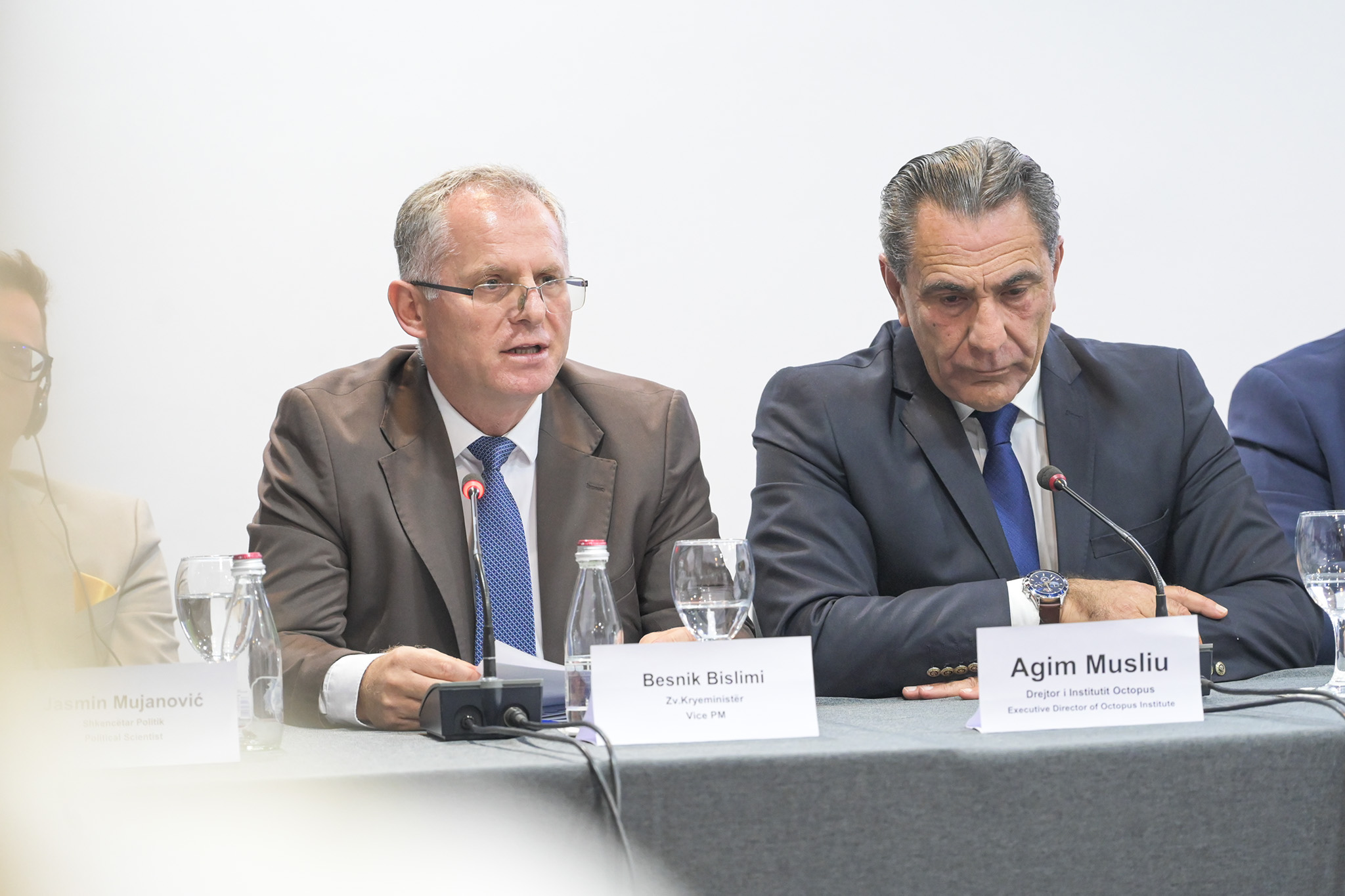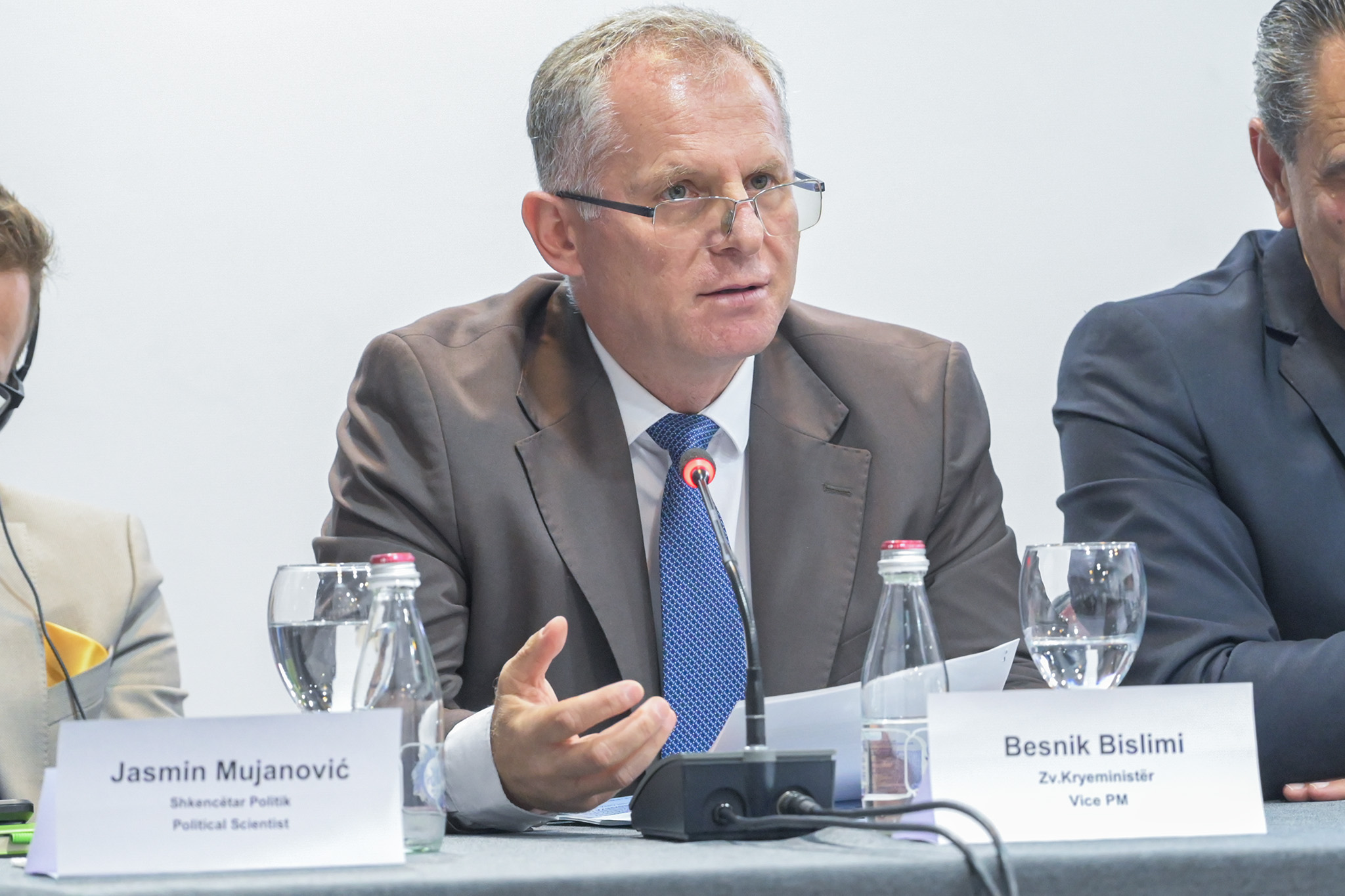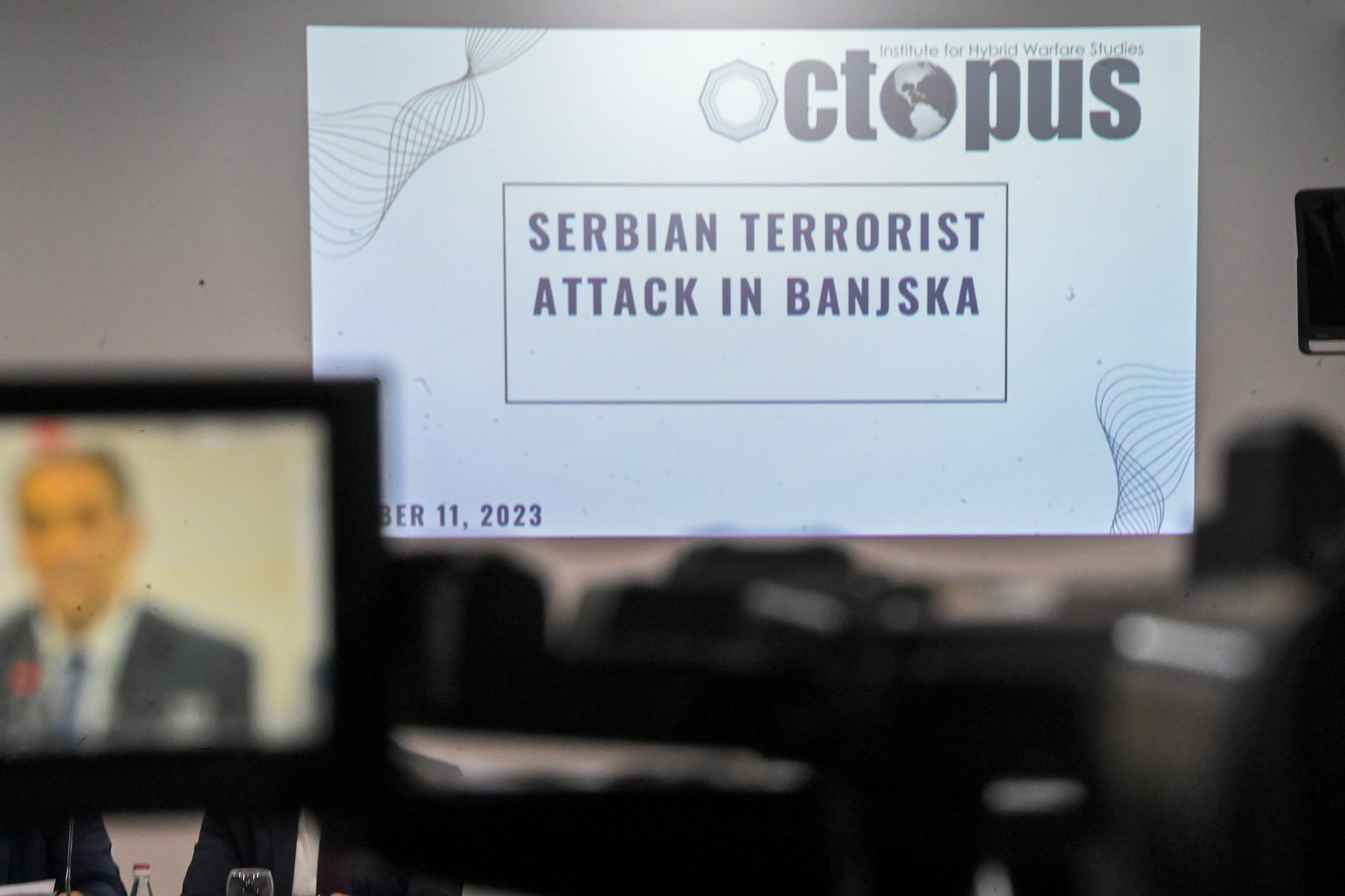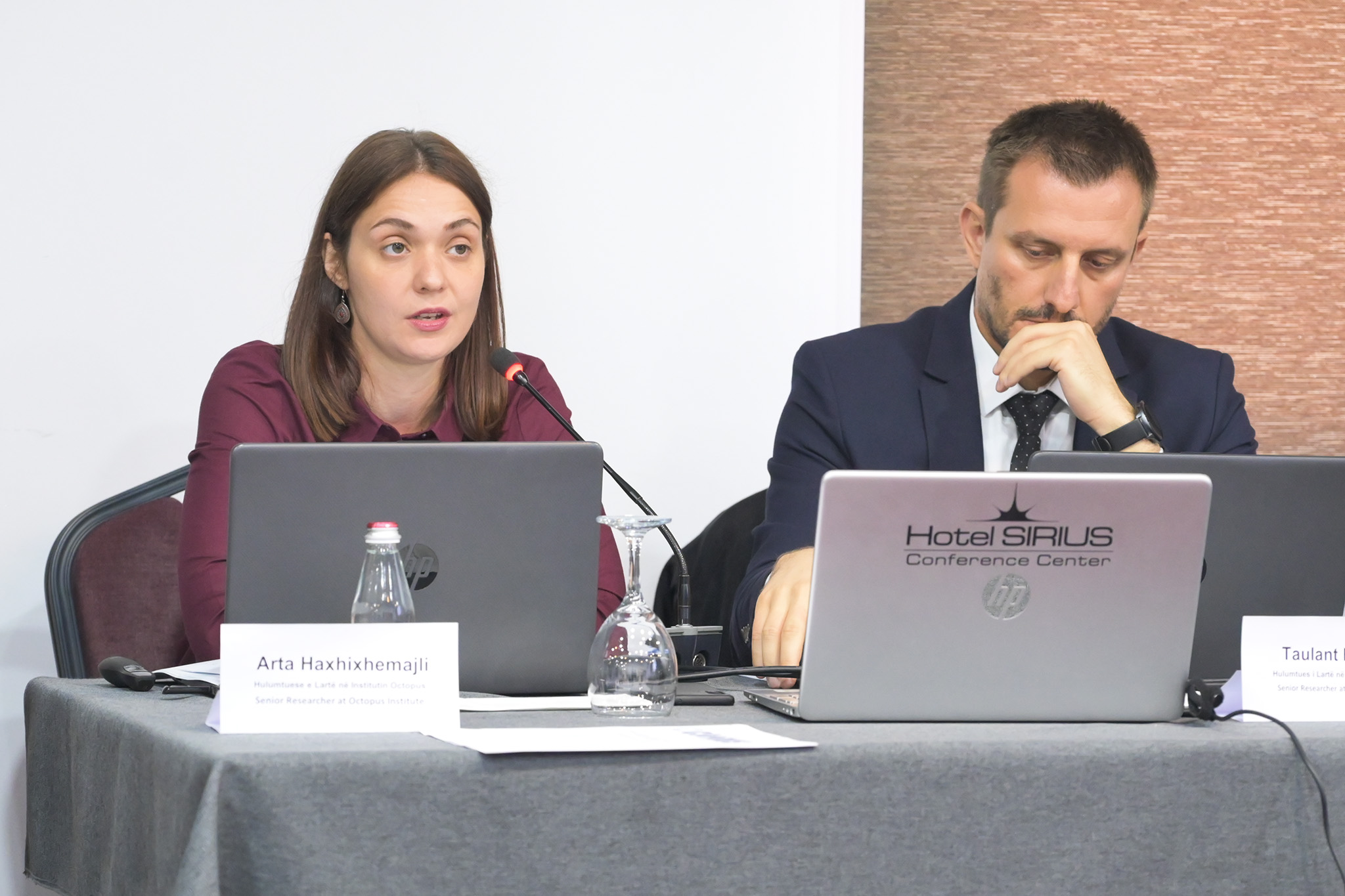Prishtina, 11 October, 2023
The first Deputy Prime Minister for European Integration, Development and Dialogue of the Republic of Kosovo, Besnik Bislimi, participated in the conference organized by the Octopus Institute entitled “The Serbian terrorist attack in Banjska: Regional and geopolitical implications”.
Deputy Prime Minister Bislimi addressed the importance of security and hybrid aggression in the Balkans, as a multiple challenge which has great potential to threaten stability, our governments, but also our society and economies, mentioning the recent attack on September 24 in Banjska of Zveçan.
“The act of aggression in Banjska has clearly raised concern not only in Kosovo, but also in the region and the entire European Union, for the reason that this type of hybrid, terrorist aggression can undo all the progress that Kosovo and Serbia have made in the past, this progress, which has been tried to be achieved through dialogue with Serbia”.
“At a time when we need diplomacy and cooperation the most, we are seeing other tactics, which make our path towards normalization and integration more difficult.” added Deputy Prime Minister Bislimi.
He said that since the post-war in Kosovo, Vuçiq has taken advantage of the fragile security situation in the north of Kosovo by using the most perfidious and criminal methods up to the unreserved support of the Serbian security structures, such as the BIA, the gendarmerie, the police and recently the army too.
“For us as the Government, it is very important to relax the Serbian citizens, to show them that this is not true because Kosovo is only interested in the integration of these citizens and has not taken any action that would make them feel threatened. But a part of the population may not have access to our official information because they are exposed to media that is completely controlled by the Belgrade regime. In this way, he is threatening them to join criminal groups to resist, as he (Vuçiq) says, the terror of the Kurti Government, and for us it is very important that Serbian citizens do not listen to such misinformation”.
Deputy Prime Minister Bislimi concluded his speech by repeating the fact that now everyone has understood that Serbia uses violent means to gain territory.
He called for Serbia to give up these acts and violent means, although we believe that the aggression of September 24 is not the first act of this drama, it will not be the last act, and it is not even the main act.
Jasmin Mujanoviq, Ilir Kuka, Ivica Mandiq, Avdo Avdiq, Rade Radovanoviq and Nazim Rashidi were part of this panel.
The complete speech of Deputy Prime Minister Bislimi:
Dear Mr. Musliu,
Dear respected panel,
Dear participants of this discussion,
Allow me to thank you for the opportunity to discuss with you today about this topic, as important as it is complicated, in general, but for the Balkan region in particular, that is, hybrid security. This topic gains importance especially when considering the strained relationship between Kosovo and Serbia, which resulted after the act of aggression in Banjska on September 24.
The conference is especially targeted, because it enables us to discuss this topic or the act of aggression on September 24 with respected colleagues from the region, since the topic of hybrid aggression has the potential to undermine the security and stability of the entire region, of Kosovo.
In particular, I want to discuss the evolution of the actors behind this case and the implications this may have on the relations between Kosovo and Serbia.
Mr. Musliu spoke more or less about the history of how Serbia sees its role in the Balkans, while the two panelists of the “Octopus” Institute told us in detail about the background of the attack or act of aggression on September 24 and presented the facts that link this act very closely with the power in Serbia.
It is important for the audience to understand the context and importance of security and hybrid aggression in the Balkans, as a multiple challenge, which, we can say, is successfully exploiting the sensitivities and divisions that exist between our countries and regions and has great potential to threaten our governments, our stability, but also our society and economies.
This creates a multiple challenge, which also affects military tactics, cyber-attacks, disinformation campaigns, in particular non-state or para-state actors, which Mr. Musliu spoke about in his introduction.
Banjska in this context can also be used as a case study, showing the connections between these instruments, even though the act as such turned out to be unsuccessful.
The act of aggression in Banjska has clearly raised concern not only in Kosovo, but also in the region and the entire European Union, for the reason that this type of hybrid, terrorist aggression can undo all the progress that Kosovo and Serbia have made in the past, this progress, which has been tried to be achieved through dialogue with Serbia.
There is a general impression that the relations between Kosovo and Serbia, after 11 years of dialogue in Brussels, have not moved towards rapprochement, but we have a greater cooling, because I think that in August 2011, when the mandate was given to the European Union to facilitate a normalization of relations between Kosovo and Serbia, the probability that something like Banjska or even the raising of MIG planes at the time of the barricades in September 2022 will happen is much smaller.
At a time when we need diplomacy and cooperation the most, we are seeing other tactics, which make our path towards normalization and integration more difficult.
The main concern, we can return to this later in the discussions, is the power that state and para-state actors have to provide false or half-truth information on purpose and in fact to give the main essence of the hybrid war, which Serbia is using and misusing excessively in this period.
Of course, this is not a new method, because Serbia has used similar methods to incite wars in the past. Suffice it to mention the case of Bosnia, a war which started with the killing of a priest and then this was used for Serbia to make available to the Serbian citizens in Bosnia all its weaponry, claiming that everything is happening from local Serbs and Serbia as a state is excluded from it.
I also want to mention what Mr. Musliu also mentioned about the beginning of Aleksandar Vucic’s career. He has managed to consolidate his power by using the services he has rendered in the past to criminals, such as Milosevic and Sesel, but also by further perfecting the criminal elements used by them and their techniques of disinformation and manipulation. In fact, Vucic had managed to consolidate the criminal underground even before he took power in Serbia, to advance this as an inseparable instrument of his government in the last ten years.
There is no need to discuss the history of this consolidation here. It is enough to mention the case of the Belivuk group, for which it was said that its main members are still in prison serving the sentence for the murder of Mr. Gjingjiq.
Since the post-war in Kosovo, Vuçiq has taken advantage of the fragile security situation in the north of Kosovo and for this purpose he has used the most perfidious and criminal methods up to the unreserved support of the Serbian security structures, such as the BIA, the gendarmerie, the police and recently also the army.
Vuçiq has consolidated criminal groups on both sides of the border. In one of them, the main ones are Milan Radojciqi and Zvonko Veselinovic, but we must say that these are not the only criminal groups that have been created and strengthened on both sides of the border.
In this fusion of politics and crime, Lista Srpska, which the panelist spoke about at the beginning, has also worked extremely well.
President Vuçiq and his exponents have probably benefited in multi-million figures also through enabling drug trafficking or the use of the north of Kosovo for drug trafficking, and we have evidenced cases of numerous laboratories, which we have found in the north as a result of successful police actions in the past two years, but this does not only include drug laboratories. We have had numerous cases of the production of crypto currencies, trafficking with immigrants, large-scale trafficking of goods, and others, but also the misuse of investment budgets not only of Kosovo, but also of Serbia, through countless tenders, which were awarded criminal groups.
Unlike Kosovo, where we are making efforts to pursue the actors involved in these terrorist attacks, the opposite happens in Serbia. If someone investigates and investigates corruption cases, then they are exposed to danger from the public structures of Serbia, as is the case with the inspectors in Jovanica.
While we see what they are doing in Kosovo, it is important to point out that they are also a branch of the government that continuously abuses the opposition in Serbia, but also does the dirty work for the Government within the territory of Serbia.
This group is also responsible for exercising violence and aggression against Serbian citizens who do not want to be disloyal to the government and official policies of Kosovo, but they want to be disloyal to Vucic’s official policies in Kosovo. The aspect of this repression extends, for example, to beatings, arson, burning of cars, throwing explosive devices, and even the murders of political officials mentioned by the previous speaker.
In a complementary way, the Serbian state has undertaken a series of other administrative measures by banning allowances, dismissing them from work, causing problems at the border, health insurance and others, for all those citizens who do not want to follow Vuçiq’s policy in Kosovo but they want to be integrated into the economic and social life of the Republic of Kosovo.
It is very ironic that a few days ago in Serbia the justice had convicted two human rights activists only for throwing eggs on a mural of the war criminal Ratko Mladic, which was placed in very large dimensions in the center of Belgrade.
The actions of this criminal group have been extremely aggressive not only towards Kosovo and citizens disloyal to them in Serbia and the north of Kosovo, but also towards the peacekeeping forces in Kosovo, such as KFOR, UNMIK, EULEX, and especially to our security agencies.
They have continuously injured and killed a significant number of local and international officials. Vuçiq has continuously tried to relativize and amnesty these criminal actions without a trace of shame, denying the findings and claims of our security bodies as untrue. At the same time, he has glorified their actions as patriotic actions, freedom-loving actions, even raising parallels between the actions of Radoicic and the actions of the Legendary Commander, Adem Jashari, of the period ’98-99.
Vuçiq goes even further and threatens the Kosovo Serbs that very soon they may experience the same fate as “Olluja” and talks about the tractors in which they will be placed to flee from Kosovo.
For us as the Government, it is very important to relax the Serbian citizens, to show them that this is not true because Kosovo is only interested in the integration of these citizens and has not taken any action that would make them feel threatened. But a part of the population may not have access to our official information because they are exposed to media that is completely controlled by the Belgrade regime.
In this way, he is threatening them to join criminal groups to resist, as he (Vučić) says, the terror of the Kurti Government, and for us it is very important that Serbian citizens do not listen to such misinformation.
Of course, this is not the first time. Serbia has produced something similar in the past, you remember the “Panda” case in 1998, which was used as a reason for the increase in criminal attacks on citizens and civilians at that time.
The theory of conflicts distinguishes a profile of individuals who promote conflicts, in the English language they are called “Ethnic entrepreneurs” and Vuçiq fully meets this criterion. He is someone who constantly tries to convince his people that they must fight with everyone else because their very existence as a nation depends on it.
Conflicts do not happen spontaneously, but it is people or instigators like Vuçiq who bring about these conflicts.
Vucic denied with full conviction the large amount of weapons they had found in a car in Zveçan, a few weeks and a short time before the date of the attack or act of aggression on September 24, saying that this is nothing more than a montage of organs of security of the state of Kosovo.
However, he remained silent when the events of September 24th came to light and identified the leader of the military and criminal group, his favorite Mr. Radoicic. The facts are now undeniable, and local and international pressure brought him out before the act was committed. It was seen that he and Radoicic were around this aggression.
Forced to act, he made a symbolic legal action, which from the first moment was removing responsibility from himself and placing the responsibility on Radoiqic. But he arrested Radoiqic and kept him in custody for less than 24 hours before releasing him without any relevant conditions.
It has been 10 years since Serbia has been telling the entire international community that it is Kosovo that has won everything from the war of ’99 and Serbia must win something. Now we are seeing what Serbia intends to win.
Since the beginning of the dialogue, Kosovo has been continuously told that the dialogue in Brussels has no alternative, but as it seems that the attempt has always been wrong, the international side had to convince Serbia that the dialogue has no alternative because with the action of 24 September Serbia is showing that it believes in alternatives that go beyond Brussels.
At the moment, Vuçiq is on the defensive because he did not expect the failure of the action, which is why he is trying to distance himself, saying that this is not in the interest of Serbia. In fact, it is a fact that the failure was not in Serbia’s interest, but the September 24 plan was not prepared with the idea that it will fail. Because Serbia has stood behind it, it should be concluded by anticipating the success of this step and not its failure. Now I believe that everyone has understood that Serbia uses violent means to gain territory and this has always been the case, it will not change now and it will not change in the future. But the failure of September 24 has caused Serbia to lose its rhythm.
We call for Serbia to give up, but we must be prepared that Serbia will not do so.
The act of aggression on September 24 is not an isolated act, it is an act within a drama. We firmly believe that this is not the first act of this drama, it will not be the last act and it is not even the main act of this drama, therefore it is very important for us to be careful and believe that Serbia will continue with such threats.
Thank you again for the opportunity to be a part of this esteemed panel.
Last modified: October 12, 2023




